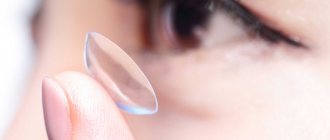Causes of dizziness from glasses
There may be several factors that cause dizziness when wearing glasses. It is worth paying attention to the synchronicity of wearing the accessory and dizziness. For example, if a person wears glasses without taking them off, perhaps his head is dizzy for another reason altogether. And if he puts them on before watching TV, and his head is dizzy during this period, he feels unwell, most likely, because of the glasses. Let's look at the most common causes of dizziness.
Unusual novelty
When the question of purchasing glasses first arises, the fact that you feel dizzy is an absolute norm. After putting on the accessory, a person may feel unpleasant symptoms as a result of:
- incorrectly selected lens size;
- hard, compressive frame;
- anti-glare coating applied to the lenses;
- uncomfortable earhook.
If all of the above conditions are normal, the dizziness will go away on its own in a maximum of a couple of weeks. If you feel dizzy when wearing the accessory after the specified period, you should consult a doctor.
Center distance
When choosing glasses, one of the leading factors is the gap between the pupils. The wrong width of the nose pad puts more strain on the eyes. That's why my head is spinning. Knowledgeable specialists spare no time in selecting an accessory for the patient. He may be offered several options for glasses so that he can feel which one is more comfortable.
Anti-reflective coating isn't just for drivers
It was previously noted that anti-glare glasses can cause discomfort. In the past, only drivers used them. But now such accessories have become more widespread. It is clear that the unusual brightness and clarity of the image leads to dizziness from the glasses. Over time, the discomfort goes away.
Thick minus lenses
The problem is that with severe myopia there is no escape from glasses with wide lenses. They put a huge strain on the eyes and also lead to distortion of the visible image. When wearing such heavy accessories, the head becomes dizzy very often, in addition, additional painful symptoms arise in the form of vomiting.
Decreased vision and dizziness: what diseases are signaled?
These are pathologies of the vestibular apparatus (labyrinthitis, Meniere's disease), cervical osteochondrosis and the accompanying vertebral artery syndrome. Dizziness can also signal serious diseases of the brain or cardiovascular system, hypoglycemia and severe injuries.
Some eye pathologies, which are characterized by decreased vision, can provoke a state of dizziness. For example, with severe myopia, a person may regularly experience a feeling of loss of balance and orientation in space. A similar condition occurs with age-related decreases in visual acuity - cataracts.
Measures aimed at eliminating the underlying disease will help get rid of symptoms that worsen the quality of life in the case of the above eye pathologies. In the case of myopia, this will be vision correction with glasses or contact lenses, or surgery. For cataracts, lens replacement surgery is most effective.
Diabetic retinopathy (a pathological change in the retina that develops against the background of diabetes and can lead to blindness) is also characterized by decreased vision and periodic dizziness.
One of the most common diseases, the symptoms of which include decreased vision and dizziness, is osteochondrosis of the cervical vertebrae. This disease is characterized by degenerative-dystrophic changes in the most mobile parts of the spine - the cervical and lumbar. The mobility of the cervical vertebrae is impaired, and the proliferation of osteophyte tissue (vertebral processes) leads to compression of the nerves and blood vessels that feed the brain tissue. This leads to the development of the so-called vertebral artery syndrome, in which the blood supply to certain areas of the brain is disrupted, which in turn causes attacks of dizziness and hypoxia.
Symptoms of vertebral artery syndrome include:
- headache attacks localized in the occipital region;
- hearing impairment – tinnitus, unilateral hearing loss;
- visual impairment – pain and spots before the eyes, decreased visual acuity, blurred vision;
- dizziness that occurs with sudden movements of the head and changes in body position in space.
Treatment of cervical osteochondrosis is complex. It includes drug therapy, physiotherapeutic procedures and physical therapy complexes, manual therapy. The patient may also be given recommendations for lifestyle changes to prevent the disease from progressing.
If you are often bothered by dizziness, accompanied by decreased vision, this is a reason to consult a specialist for a comprehensive examination, identify the cause of the development of the pathology and take measures to eliminate it. Take care of your eyes and be healthy!
- Interesting
Conjunctivitis: about the disease and its treatment
- Interesting
How to maintain normal vision in a child?
- Interesting
Visual hygiene. Taking proper care of your eyes
Dizzy in the lenses
There are also situations when, on the contrary, you feel dizzy without glasses. For example, a person decided to switch to using contact lenses. It happens that during such a transition, health worsens. Reasons may include:
- incorrectly selected size, because of this the person greatly strains his vision and becomes dizzy;
- high intraocular pressure;
- corneal diseases.
In any case, you will need to consult an ophthalmologist. Before going to the hospital, contact lenses must be removed from your eyes.
Causes of the symptom
Dizziness when wearing glasses is not considered normal, although this phenomenon occurs quite often.
If this symptom persists, you should consult a doctor and find out why this is happening. Very often, dizziness has nothing to do with glasses. It is provoked by undiagnosed diseases characteristic of the patient, overwork, stressful situations, bad habits and much more. Sometimes wearing glasses can aggravate the pathology, which is why people suffering from visual impairments complain about this symptom.
Leading causes of dizziness
But in some cases, an unpleasant deviation occurs precisely because of glasses. This happens especially often if the accessory is new. The body needs to adapt to the way the eyes now see. Before this, the brain perceived information with distortion due to visual pathologies.
Receiving accurate information can be disorienting and tiring at first. An additional problem is that seeing things clearly puts more strain on eyes that were previously unable to capture as much detail. This leads to increased eye pressure, pain, weakness, nausea and dizziness.
If this is the reason, then the body must adapt to the new sensations within a few days. To make the adaptation process easier, you should not wear glasses for a long time. The duration of wearing periods should be increased gradually. The same thing happens if you had to replace the lenses in your glasses with stronger ones. New visual sensations tire the eyes, which causes dizziness.
Expert advice for quickly adapting to glasses
But it also happens that an unpleasant phenomenon does not go away after a few days, but persists and even intensifies. Then it is worth contacting an ophthalmologist, as this may be a sign that the selected lenses are not suitable for the patient. There may also be problems with the design of the frame. That is, sometimes a pathological symptom can arise precisely because of glasses. The main reasons for this are as follows:
- incorrect selection of lenses;
- squeezing the temples with the frame;
- pressure of glasses on the bridge of the nose;
- improper fit of the frame for the pupils;
- significant difference in diopters between previous and new lenses;
- the presence of an anti-reflective coating (if it was not there before);
- large thickness of lenses designed for nearsighted people.
Almost all of the listed defects (except the last two) need to be eliminated, although the patient may be able to adapt to them. But such a device can affect his health, causing problems with blood pressure and increased eye diseases.
The body adapts to the anti-reflective coating quickly enough, and the unpleasant problem will disappear. And people with severe myopia will have to adapt to wearing just such glasses.
My head is spinning in my new second glasses
Often, when buying new glasses, people focus exclusively on diopters. However, this is not true. Your head may hurt when wearing second glasses if you did not pay enough attention to the following factors when purchasing them:
- Diopter difference for looking into the distance or in front of you. For example, the lens size is different for reading a newspaper and for distinguishing the number of an approaching bus.
- The presence of strabismus, a special note is made in the prescription for correction.
- Interpupillary distance.
Therefore, you should purchase a new accessory in specialized optical stores with a prescription.
How to choose glasses frames based on your skin tone
— For dark skin, it is recommended to choose frames in warm colors: red, tortoiseshell, copper, coral, creamy, peach, golden, honey, orange, khaki, beige.
— Pale skin is suitable for frames in cool colors: white, amethyst, steel, purple, pale pink, gray, blue, plum, silver, jade, anthracite.
— To revive aging skin, older people can be advised to wear frames in red and purple shades.
Only by taking into account all these recommendations can you hope that glasses will not become an inferiority complex for you, but a stylish and desirable accessory that emphasizes your individuality.
How to understand the problem
To eliminate the condition when you feel dizzy while wearing glasses, you will first need to establish the cause that led to this. It is impossible to do this on your own. Therefore, the patient will necessarily need to visit a health care facility. In most cases, the patient is prescribed the following diagnostic procedures:
- Ultrasound examination of blood vessels.
- CT, MRI of the cerebral cortex.
- X-ray.
- Blood analysis.
If there are concomitant alarming symptoms, additional research methods will be prescribed.
How to avoid trouble
There are several recommendations, the implementation of which will help prevent unpleasant consequences in the form of dizziness during vision correction:
- Before purchasing new glasses or lenses, you must be checked by an ophthalmologist; you will not be able to buy a quality product using last year’s prescription.
- You will need to pay attention to the quality and correct shape of the component parts of the accessory: temples, frames, nose pad.
- Before you finally make a choice, you need to try on and sit for a while in the glasses to understand whether they fit and whether you feel dizzy.
- You can’t wait and wait to get used to the new thing. If pain occurs, you should seek medical help.
How to choose the right glasses frame for your eye color
To make glasses pleasing to the eye, you need to know how to choose the frame of the glasses and the color of your eyes, because the color scheme is also involved in creating a stylish look. Even if the glasses are in harmony with your oval face, but the color does not suit your eyes at all, consider it a failure.
— Green-eyed beauties are recommended to choose frames in green, orange and burgundy (dark red with a purple tint) colors.
— For brown-eyed people, it’s better to opt for lilac, tortoiseshell (black and red), red or coffee frames.
— For those with hazel eyes, we can recommend emerald-colored frames.
— Gray and blue eyes will harmonize with frames of brown, dark blue, or steel color.
If you consider these tips for choosing frames, you will be surprised at how beautiful and stylish your glasses will look on your face.
Traditional medicine treatment
There are several proven recipes for use at home that will help reduce discomfort and eliminate headaches during vision correction. Let's list the main ones:
- Finely chopped fresh parsley must be wrapped in gauze, that is, two, one for each eye. The resulting compresses will need to be applied to the eyes for twenty minutes. The product will relieve tension.
- In the freezer you will need to freeze ice cubes from a decoction of mint and lemon balm. Before this, the herbs need to be brewed for fifteen minutes. Use the resulting cubes to walk over the skin around the eyes. In five minutes your head won't feel dizzy.
Prevention
To prevent headaches when wearing an accessory, effective preventive measures will help:
- You should wear glasses only when it is really necessary, and not all day long.
- Take walks every day.
- Take breaks while working at the computer.
- Don't get carried away with watching TV.
- Eliminate psycho-emotional stress and nervous shock.
- Give yourself a rest and a good night's sleep.
- Do not drink cocktails containing alcohol.
- Do special visual exercises.
Charger
Let us dwell in more detail on gymnastics, which will relieve the condition. when you feel dizzy. Let's look at the best exercises:
- It is necessary to move only with the eyeballs, without the participation of the head, in turn up and down, left and right.
- You will need to lean your head forward and rest your hand on your forehead, as if resisting yourself.
- For the next exercise you need to select an object in the distance. First you need to close your eyes, then open your eyes and focus on the selected object. Repeat at least ten times.
When you feel dizzy while wearing glasses, it can happen for completely harmless reasons. On the other hand, such manifestations may signal the development of a pathological process in the internal environment. Therefore, at the first dizziness, you must urgently contact a medical facility for help.











